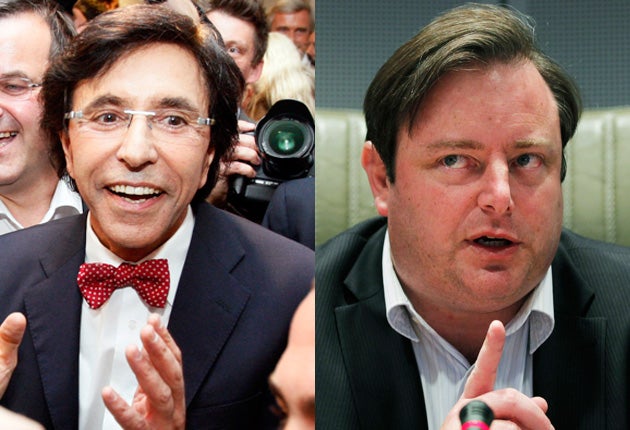The odd couple who hold key to Belgium's future
Election sees unlikely partners begin talks on coalition – and splitting country in two

One is a burly nationalist and vociferous advocate of an independent Flemish homeland. The other is a wispy, bow-tie wearing Walloon determined to keep Belgium united.
Meet Bart de Wever and Elio di Rupo, the unlikely duo now in charge of forming a coalition government in the chaotic aftermath of Belgium's elections. The 39-year old populist and the veteran Socialist are chalk and cheese both in terms of looks and outlook, but they hold the key to either keeping the country together or taking the first steps towards tearing it apart.
Mr de Wever's New Flemish Alliance (NV-A) won a stunning 28 per cent of the vote in Dutch-speaking Flanders on Sunday, sending shockwaves through this linguistically divided country of 10.6 million people. It also won the most votes nationally, followed by the French-speaking Socialists (PS) of Mr di Rupo.
The result has earned Mr de Wever the nickname of "Cannibal" and makes his by far the largest party in Flanders. Cheered on by a jubilant crowd belting out the Flemish anthem, Mr de Wever promised his voters that "tomorrow, we will awake to a black and gold Flanders" – a reference to the black lion emblazoned on the yellow Flemish flag.
Yet for all his inflammatory pledges, the Flemish historian has sounded surprisingly conciliatory since his victory. He immediately extended an olive branch to his Walloon partners to start institutional, linguistic and economic reforms, a painful process that has bedevilled relations between the two sides and which has sent many a government tumbling in recent years.
"I am reaching out a hand to the Francophones. No one has anything to gain by blocking our country. Not reforming means we all get left behind. If we dare to change, we will all benefit," Mr de Wever said.
A doomsday scenario could be avoided if Mr de Wever and Mr di Rupo quickly manage to cobble together a coalition, Belgian commentators say. "Bart de Wever does want independence and he thinks Belgium must disappear and break up into separate regions. But that doesn't mean it will happen tomorrow," Carl Devos, a politics professor at Ghent University, said in an interview. "People would not have voted in those numbers if De Wever were asking for independence tomorrow. He does not have the majority he needs to break up Belgium, not even in Flanders. He knows this and that's why he's become less radical in the past weeks."
Just as Mr de Wever has made clear his desire for a "soft evolution" and "not a revolution" towards more autonomy for Flanders, so Mr di Rupo has also taken his political cue to advocate dialogue. "Many Flemings apparently want our country to evolve. And if we want to stabilise our country, our Belgium, we must take that message on board," he told reporters. "We Socialists have always been willing to reform and we must now make a deal. We francophone politicians will have to reach out to the Flemish. Just as the Flemish will have to reach out to us."
However, it could take months for the two men to form a government as they will have to bring on board other parties, risking a stalemate at a time of ballooning public deficit and spiralling debt. Belgium is also set to take up the reigns of the rotating EU presidency in July, a job it can hardly take on without a government.
Mr di Rupo looks set to become Prime Minister and would be the first francophone to hold the post since 1973.
Join our commenting forum
Join thought-provoking conversations, follow other Independent readers and see their replies
Comments
Bookmark popover
Removed from bookmarks